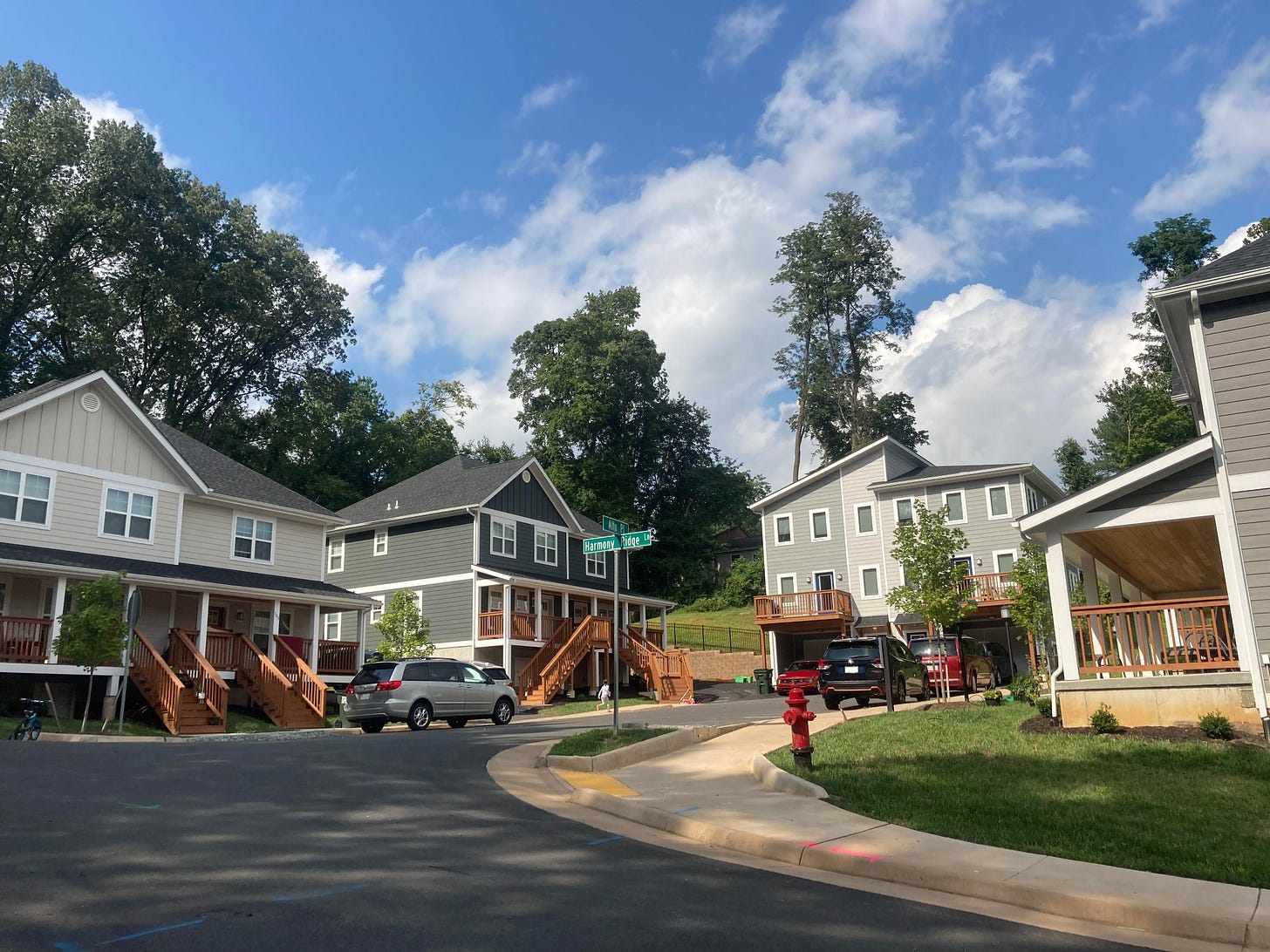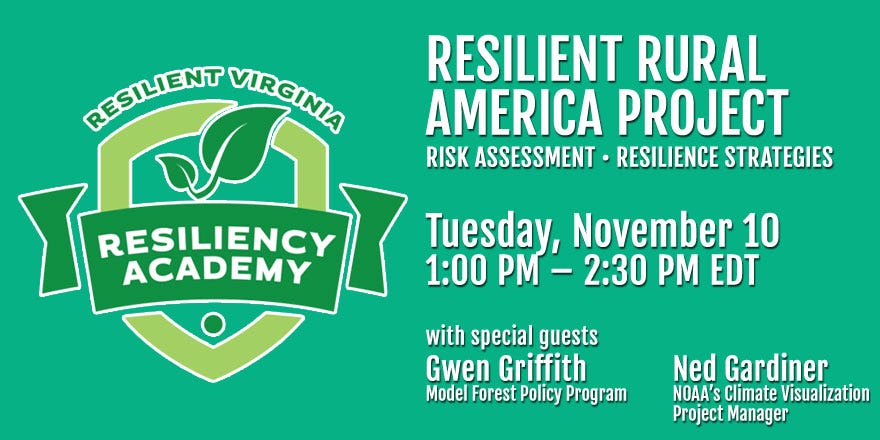Today's Patreon-fueled shout-out is from a supporter who wants you to consider a donation for Monica Johnson, a Pro Strongwoman who will be competing in a charity powerlifting event on November 21 called Make Every Rep Count.
Gregory Carey-Medlock is donating 30 cents for every pound Monica squats to the Blue Ridge Area Food Bank. You can choose between three other charities. Learn more at Shenandoah Power. Sponsors accepted through November 14.
*
Over the weekend, the Virginia Department of Health reported the highest number of new daily COVID-19 cases yet with 2,103 new cases reported Saturday. On both Sunday and today, the VDH reported 1,302 new cases. The seven-day average for positive PCR tests has increased to 6.1 percent, up from 5.9 percent on Friday.
In the Blue Ridge Health District, there have been 70 new cases reported and the seven-day daily average for new tests is 21. The percent positivity in the district is 1.7.
Some middle and high school students in Albemarle County return to classes today for in-person instruction. These are students who haven’t been engaging in virtual learning and will now have access. The metrics on the Centers for Disease Control pandemic dashboard haven’t been updated with today’s figures, but all but one of Albemarle’s metrics are all in green for moderate risk. The total number of new cases per 100,000 persons within the last 14 days is 91.06, indicating higher risk.
However, looking to the west in Virginia will show signs of concern. In Alleghany County, the 14 day metric is at 710.9 today, with 50 new cases reported on Saturday, though none yesterday and one today. In Wise County, the 14 day metric is at 710.3 with 67 cases reported Saturday, 16 on Sunday, and 9 today. The percent positivity for VDH’s Far Southwest region is 12.8 percent and 8.6 percent for the Near Southwest Region. That number is 4.2 in VDH’s Northwest Region, which includes Albemarle and Charlottesville.
I asked VDH about the high number of cases and got this response.
COVID-19 cases reported for Virginia on Saturday, November 7, are the greatest number of cases reported to the Virginia Department of Health (VDH) in one day thus far in the pandemic. The Southwest region of the state continues to experience a surge in cases with substantial transmission. VDH strongly encourages all Virginians to practice physical distancing, wear a mask, and stay home if they are sick, have been diagnosed with COVID-19, are awaiting COVID-19 test results or are a close contact to someone with COVID-19. Visit the VDH website for steps you can take to protect yourself and others.
*
Oral arguments were held Friday in the Virginia Supreme Court for the city of Charlottesville’s appeal of a court ruling that Confederate statues in city parks were protected war memorials at the time City Council voted to remove them. An injunction remains to keep the statues in place even after legislation passed the Virginia General Assembly this year. Interim City Attorney Lisa Robertson argued that there were two major facts that supported the city’s appeal.
“Fact number one, plaintiffs never asserted there was actual physical damage or harm to the statues,” Robertson said. “Fact number two, Charlottesville’s statues were not installed pursuant to any state enabling legislation, general or special, which expressly authorized them to be erected as war memorials.”
Kevin Walsh represented the Monument Fund, the organization that filed suit against the city for voting to remove the statues and covering them with tarps after the Unite the Right Rally of August 12, 2017. He picked up on a line of questioning from one Justice about whether the tarp was an “encroachment.”
“The words physical damage appear nowhere in 15.2-18.12-1,” Walsh said. “There are four purposes that are listed for which damages may be awarded and they include preserving as well as restoring to pre-encroachment condition. And of course tarps are an encroachment and they were restored to pre-encroachment condition by the order that they were to be removed.”
Walsh acknowledged the General Assembly has changed the law removing the protection, but argued the new provisions do not necessarily apply to the Charlottesville statues.
Justices will issue a ruling at a later date. Previous opinions can be viewed at the Virginia Supreme Court website.
*
On Saturday, Habitat for Humanity of Greater Charlottesville dedicated ten new homes at its Harmony Ridge development at the corner of Fifth Street and Bailey Road in the city. The project is the eighth mixed-income neighborhood built by the organization. Dan Rosensweig is the chief executive officer of Habitat for Humanity.
“This day has been a long time coming and the community has been in the making for a number of years,” Rosensweig said. “In fact the idea of a mixed-income neighborhood on this site, a place where people from all walks of life can come together to share a common destiny, has been a dream for many people for almost two decades.”
Abundant Life Ministries had owned the land and they had intended to develop it, but Habitat took over the project. The Piedmont Housing Alliance invested in two homes, and the CFA Institute covered the cost of making the units energy efficient. Rosensweig said a decision was made to complete the units faster once the pandemic hit.
“We just knew that we needed to find a way to not just finish but to expedite the completion of these homes,” Rosensweig said. “Out of the spotlight, this team got to work. They figured out how to build the homes themselves while at all times maintaining social distance. Little heroic efforts like bringing pieces of trim home to paint them and coming back at night to install them.”
You can listen to the dedication on Habitat’s YouTube page. (watch)
*
The election results last week showed one way that rural and urban America are generally divided. About 15 percent of the population lives on about 72 percent of the nation’s land. Tomorrow, the organization Resilient Virginia will convene a discussion about ways to prepare communities in rural areas for increased incidents of extreme weather associated with climate change. The speakers will be Gwen Griffith of the Model Forest Policy Program and Ned Gardiner of the National Oceanic and Atmospheric Administration’s Climate Visualization Project. They’ll talk about the Resilient Rural America Project. Registration is $20. (register)
*
Tonight at 7 p.m., Wild Virginia will hold a book club for anyone who has read Janisse Ray’s memoir, Ecology of a Cracker Childhood. I spoke with Janisse last month about her thoughts on the pandemic.
“I focus on nature and culture always with the eye toward thinking about the stories that people need to hear to open their hearts and their minds,” Ray said.
Ray described the beginning of the pandemic in March as a time just like after a car crash when suddenly everyone involved has to figure out what to do next. She said that’s given many an ability to gain new perspectives.
“It’s allowed us this opportunity to really examine how our lives are working, our marriages are working, our jobs, our family life, you know our town, how’s everything working or not working for us,” Ray said.
Ray said she will talk tonight about how she has used this time to anticipate other issues facing our world, such as the climate change crisis hitting earlier than had been expected. For her, spending time at home made her notice something.
“I did not realize how many airplanes were crossing the sky and how many contrails,” Ray said. “So in so many ways, the pandemic is returning to us ways of life that we’d even forgotten existed.”
Ray said she has spent much of the past 20 years traveling across the country to give presentations. Not being able to do that has led her to realize that so much mobility came at a cost.
“The pandemic has forced us to do some of the things that we have always needed to do for the environment but were unwilling to do,” Ray said.
The free event sponsored by Wild Virginia begins at 7 p.m. tonight. (register)
`
*
Technically there are six more weeks or so left this autumn, but the Virginia Department of Transportation is already preparing for the possibility of winter weather. According to a news release, VDOT has a $211 million budget for snow removal, more than 11,300 pieces of snow removal, more than 690,000 tons of salt and other forms of grit, and more than 2.1 million gallons of salt brine and liquid calcium chloride.
“Our top priority is the safety of those on our roadways,” said VDOT Chief of Maintenance and Operations Kevin Gregg. “The Commonwealth has more than 128,000 miles of state-maintained roads and bridges, so we prepare year-round to keep Virginia moving when winter weather arrives. Our crews are trained, experienced and equipped to handle snow and ice before and after it hits the ground.”
There’s also an online tracking tool which allows people to chart the progress of snow plows.


















Share this post